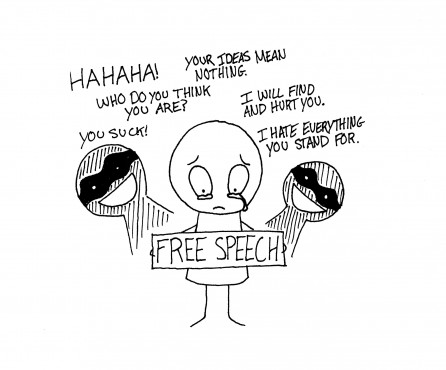We need to talk about anonymity.
Earlier this year, I downloaded Yik Yak to keep an eye on what students at UVic were talking about (newspaper editors need to stay in the loop), and, for the most part it’s been fruitful. I can’t say I’ve found any hot news tips there, but I have learned that UVic students are quite clueless about, well, a lot of things — not the least of which is what’s going on with their student union.
This ignorance was amplified during student elections, but what’s frightening is how it was twisted into a very ugly form of discrimination. Unite candidates, Woke candidates, advocacy groups — all were targets of a verminous subset of the UVic population. And make no mistake here: these are UVic students we’re talking about, and they’re walking among us more polite folk with impunity. (Where’s “Rowdy” Roddy Piper with the magic glasses when you need him?) Reading what they had to say made me want to pour bleach in my ears.
And that’s the problem: anonymity via social media and the internet at large have allowed disgusting rhetoric to fester unchecked. This is not a new issue. But speaking out about it feels approximately as effective as throwing a bouncy ball at a brick wall hoping the wall will fall down. It won’t. But what other recourse is there? Another thinkpiece?! (Yes, for now.)
[pullquote]
Anonymity via social media and the internet at large have allowed disgusting rhetoric to fester unchecked.
[/pullquote]
Both UVSS Director of External Relations Kenya Rogers and Chairperson Brontё Renwick-Shields spoke out at the lead director’s debate on March 1 against people spewing this harmful rhetoric under the guise of freedom of speech. Contrary to what those on Yik Yak and Facebook may think, Rogers was not saying free speech itself was a problem; rather, I interpreted her as saying that the entire discussion privileges those who have the loudest voice anyway. In other words, the students who say their right to free speech is being trampled are usually saying that in response to someone who’s rights actually are being trampled (like marginalized students). Again, this is nothing new, but it’s worth repeating.
Anonymity exacerbates this problem. Not only are these people speaking over marginalized voices, but they’re doing so without any risk of repurcussions. (Hell, there’s nothing stopping them from appropriating marginalized identities either.) You can’t do much about a troll on Yik Yak, Reddit, or any platform allowing individuals to hide behind an alias.
That’s not to say anonymity has no value. When it comes to protecting an individual from real harm, such as reporting sexual assault cases, then, yes, your identity should be kept hidden. When you’re in a minority position in society, already being ostracized simply for existing, rather than for blathering idiotic statements which people rightfully denounce you for, then anonymity is understandable.
But anonymity, besides being a word I can never spell right the first time, is wielded as a weapon by those who really don’t need it, often against those who need it more. And if you’re hiding behind a curtain like some cretinous low-rent Wizard of Oz while taking potshots at those who have no way of fighting back, you’re not allowing for a rich and fruitful discourse.
You’re just a coward.








